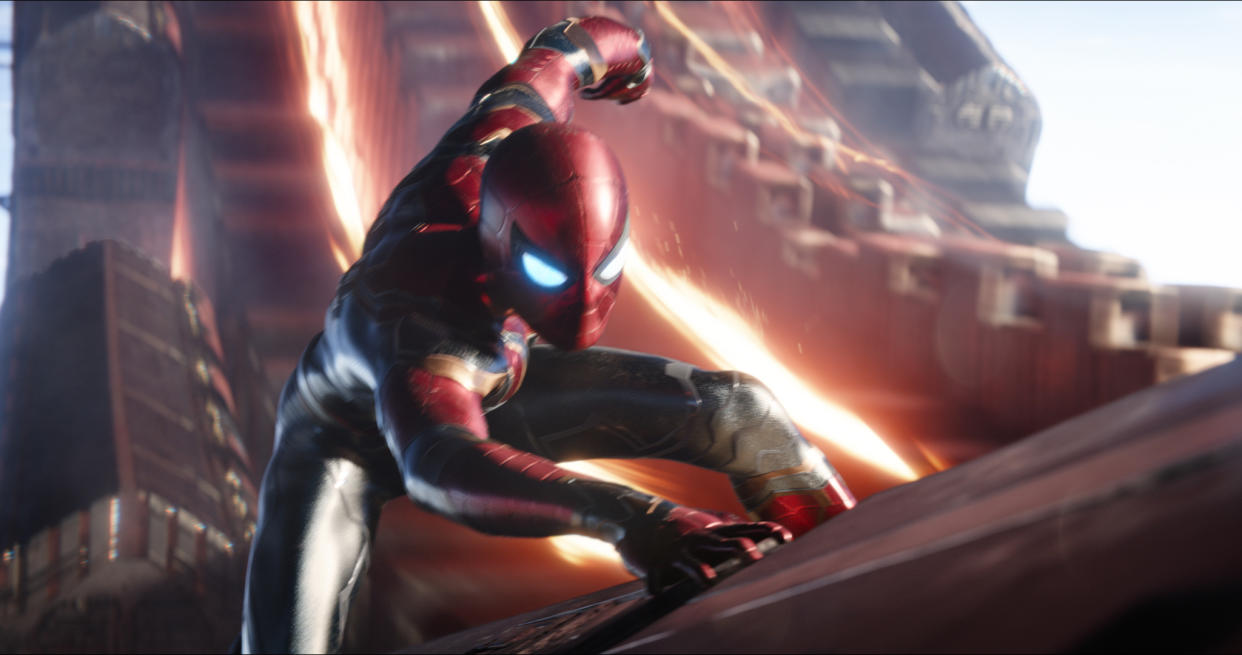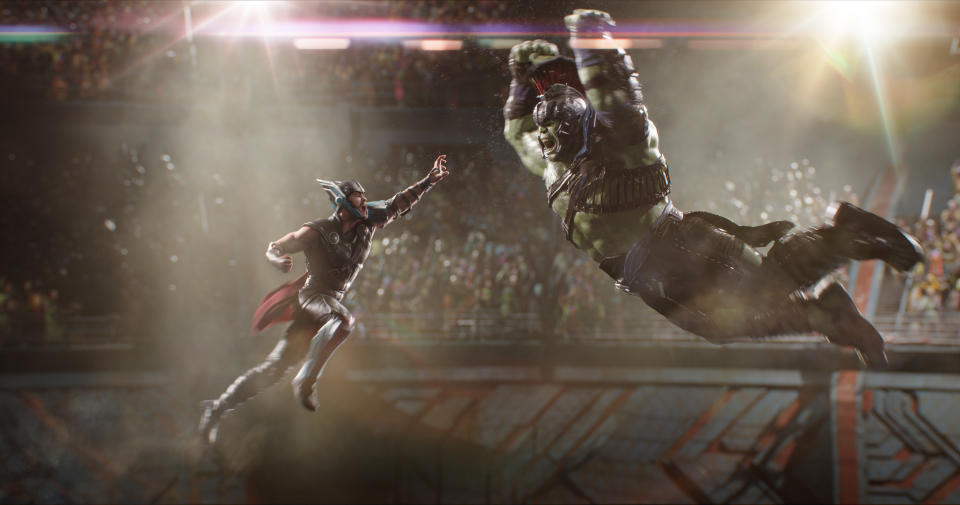Why 'Avengers: Infinity War' was 'a magician's game' and why Marvel is releasing it earlier

While prestige dramas dominate the annual awards conversation, blockbusters truly rule modern Hollywood, and no one produces them with the same consistently high quality and mass appeal as Marvel Studios. Over the past decade, Marvel — first in collaboration with other major studios and then on its own — has forged an interconnected movie universe that has been so successful, it’s now the template everyone else desperately wants to duplicate.
One of the visionaries at the helm of the Marvel Cinematic Universe is Victoria Alonso, who began as a co-producer on Iron Man, which kicked things off in 2008, and who has served as executive producer on every Marvel outing since 2012’s The Avengers. Alongside studio president Kevin Feige and fellow executive producer Louis D’Esposito, Alonso has spearheaded Marvel’s rise to the apex of the industry. And that’s why she’s the person uniquely qualified to speak about the past, present, and future of the MCU, which is precisely what she does in the following wide-ranging interview about her Marvel tenure, the MCU’s most recent installments — Thor Ragnarok (now available on Blu-ray); the studio’s “pride and joy,” Black Panther; and next month’s hugely anticipated Avengers: Infinity War — and whether the Hulk will ever get another solo movie.
Yahoo Entertainment: Thor Ragnarok arrives on Blu-ray today, and it’s defined by a unique comedic sensibility. How did the decision come about to hire director Taika Waititi and to take a more humorous approach to the character?
Victoria Alonso: When you see the movie, you go, “Of course, Taika is the perfect fit.” And when you’re hiring, you go, “What, Taika? Really? For Thor?” [Laughs] What we wanted to do was, we wanted to shake it up a little. We wanted to do something completely different, completely unexpected, and I think one of the things is — Thor without a hammer, Thor without his hair, and Thor in his cheeky, comedic way. I don’t know if you can get more unexpected than that. So we just wanted to show audiences that not everyone is one-sided. There’s all kinds of ways, and different experiences.
What was the biggest challenge you faced on the film?
Once we decided to shake it up, we wanted to make sure you stayed within the character, and not a caricature. Because it was really easy to ham it up to the point where you’re in a completely different place, but you lose your character. The one thing I’m incredibly proud of is that Thor is still Thor. He doesn’t have a hammer, and he doesn’t have his hair, but he’s still the Thor we love — and you learn that he’s actually pretty darn funny, you know what I mean? So for us, it was to try to stay as true to the Thor that we had met on the first two movies, and to also show a different facet of who he can be.
How early on do you decide which other characters will be involved in a given MCU film? Is that planned out years earlier, or does it only come together once preproduction begins in earnest?
It’s a little bit of everything. Sometimes it’s very early on, because it’s part of the fiber of the storyline that we’re going to tell, and then the director comes onboard and he or she says that they’re thinking about this, and we go, “Oh, that’s a great idea.” Or it’s halfway through the process, where you see where the storyline is going, and you go, “Oh, but wouldn’t it be great if…” And then sometimes we do a tag scene, and it’s a little later in the game. We keep it a little open so we can maintain the Walt Disney charm that we use a lot at Marvel. Just trying to make it better every day. And these movies take anywhere from two to two and a half years to get done, so sometimes other things happen in our other movies during that period. You know, in the last two years, we’ve put out seven movies. So there’s a lot of story that’s happened that we didn’t know when we started with this one — and we have to thread it all together.
Hulk starts really speaking in Thor Ragnarok. At what point did you decide the character would be developing in that way, and do you see that evolution continuing in future films?
We love our Hulk, and we wanted Hulk to have a different dimension, by saying some words. He doesn’t have the whole vocabulary — there’s no dissertation on astrophysical facts — but he does have enough words that he can communicate with Tessa Thompson’s character for sure, because they’re buddies, and Loki and Thor. He can be very engaging, and Hulk is an evolving character. Hopefully we’ll see more of him in other movies. And you never know — maybe we will, maybe we won’t. I can’t disclose, Nick!
So far, though, there are no plans for a stand-alone Hulk film?
You’re correct — we don’t have that plan.

You’ve been involved with the MCU since the beginning, with 2008’s Iron Man. What’s been the biggest change, in terms of approach, or attitude, or outlook, that’s taken place since you first embarked on this industry-changing course?
By and large, it’s the same mindset. It’s the same people — it’s Lou [D’Esposito], Kevin [Feige], and myself at the helm of the company. We’re doing preproduction on our 23rd film, and we’ve put out 18 to the world together. We approach it very much the same way. We’re older, we hope to say that we’re wiser — but who knows? We used to do one movie a year, and now we do three movies a year. So the volume has changed. And that has raised a set of challenges, because you only have 24 hours in a day. But I think the beautiful thing about the harmony we have is that we have a shorthand. You know, if you had to start from scratch with every production elsewhere, that’s something you need to grow into. Whereas for us, we come to the table with our pattern woven on who we are and how we operate. There are a lot of things we can anticipate for each other and for the films. That is the beauty of being together for almost 13 years.
Black Panther has been an enormous hit for the studio. Has its immense success prompted any changes regarding the studio’s future MCU plans?
Well, yes and no. The future projects are very much how we thought about Black Panther two and a half years ago when we started. We don’t think about the strategy due to the success of the film. We think about how we want to shake it up when it comes down to us doing different films. Because if you do cookie-cutter and all the same, then we’re done, we’re bored. Our idea is always to try to shake it up.
This movie is very much our pride and joy. We believed in it for more than two years; we believed in it for a very long time, and I can’t tell you how proud we are that it’s out in the world. And also, that the world has said, “Yes, we want it,” and we honor it, and we beyond honor it — we cherish it.
You also have Avengers: Infinity War coming out soon, and it’s clearly the studio’s most ambitious project to date. What’s been the biggest, or most unusual, challenge with that film?
When you have 40 to 50 of the most successful actors in the world, it’s a scheduling nightmare. And it’s a movie that we shot for 18 months, which we’ve never done before — because we shot Infinity War Part 1 and Part 2 back to back, and we were shooting Part 2 while we were posting Part 1, but also doing additional photography for Part 1. It was a magician’s game. But we announced last week that the movie is going to come out a little earlier, because people are so excited, and there’s a lot of anticipation about this film. We’re ready to give it to the world, so it’s now coming out on April 27.
Read more from Yahoo Entertainment:

